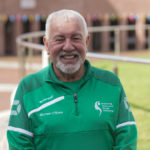 About the Author: About the Author:
Jamie Googan started to stutter in early childhood, he is a former National Champion in Tae Kwon Do and a proud member of the Irish Stuttering Community. Having struggled with the challenges of stuttering for almost twenty years, Jamie reached out and asked for help. Speaking powerfully now, Jamie has transformed himself and actively advocates for Stuttering and Mental Well-being Awareness. During his time working at Munster Technological University, Jamie set up the first mental health initiative for twenty-two secondary schools in the Cork community. Jamie is the author of “Access The Students Voice” and is often featured on radio and TV promoting Stuttering Awareness and Mental Wellbeing issues. Jamie has represented the Irish community all over the world and has addressed Irelands highest ranking members in the political sector on stuttering.
 Born in 1955, Michael O’Shea, born in 1955, is married to Monica. Together they have two sons and seven grandchildren. They live in Kilkenny, Ireland. Michael has been challenged by stuttering since the age of four. He is the author of “Why I Called My Sister Harry” which was researched and published in 2007. Michael is a long-standing advocate for members of the stuttering community world wide, he has presented at numerous International stuttering conferences on four continents over the past fifteen years. Michael was the co-founder of “The National Stuttering Awareness Day” in Ireland which launched in 2007, and is a former board member of the Irish Stammering Association. Born in 1955, Michael O’Shea, born in 1955, is married to Monica. Together they have two sons and seven grandchildren. They live in Kilkenny, Ireland. Michael has been challenged by stuttering since the age of four. He is the author of “Why I Called My Sister Harry” which was researched and published in 2007. Michael is a long-standing advocate for members of the stuttering community world wide, he has presented at numerous International stuttering conferences on four continents over the past fifteen years. Michael was the co-founder of “The National Stuttering Awareness Day” in Ireland which launched in 2007, and is a former board member of the Irish Stammering Association.
|
![]()
![]()
Wonderful message, Jamie and Michal!
Hey Jamie and Michael!
Must have been the luck of the Irish to come across this post! I am so grateful we have programs all over the world that advocate for people with stuttering!
My name is Morgan, I am currently a student at California State University of Fullerton.
I am currently pursuing a career in Speech Pathology.
My question to you both is if you have had any speech therapy and what your experience was like and if so, what insight you would give me as a future speech therapist?
Kindly,
Morgan Kim
Hello Jamie and Michael!
What a wonderful message of support! I am a speech pathology graduate student at Idaho State University, currently enrolled in a fluency disorders class, and would love to get more insight into how stuttering is perceived and treated in Ireland. As part of my course, we have explored many previous historical perspectives and methodologies concerning stuttering and its treatment, not all of which took into account the individual’s perspective or experience of their own stuttering, and far too many of which focused on fluency as the overall goal.
From what I’ve learned in class, holistic treatment based in self-awareness, self-acceptance, and the use of positive reframing and other cognitive behavioral counseling techniques, are the current gold standard for affecting positive quality-of-life changes for people who stutter. I’d be very happy to hear your perspective on this!
I am so glad to learn of an organization such as yours which puts the individuals mental and emotional health as a main priority. I am curious – do many of your members have prior experiences with speech therapy? Are those experiences generally seen as positive or negative? Do speech therapists in Ireland generally focus on fluency as the main target, or is it a more holistic approach similar to what I described above?
Thank you so much for your time,
Hanah McCabe